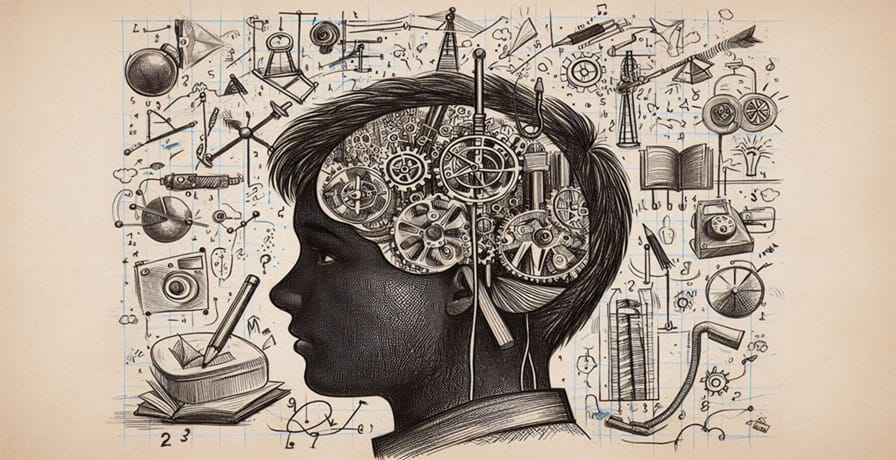Hidden Stress, Mounting Costs

We are not a mystery, but we're not simple either. This week we explore the maze of cause, effect, and stress.
Follow me on LinkedIn or join my growing Bluesky!
Research Roundup
A culture of stress
Stress isn’t an abstract concept; it’s a measurable, biological process with consequences.
One way to measure stress is salivary cortisol. Used to track changes in stress in kids, we learn something fascinating: some children’s neurobiological stressors differ by culture. Among a group of Chinese preschoolers “achievement-related stress” drove cortisol increases. In Japanese children it was “interpersonal-related stressors” that elicited cortisol increases. In contrast, “U.S. preschoolers showed decreased cortisol responses after these stressors but consistently higher levels of anticipatory responses to separation at the beginning of each session”. It’s important to understand that these or average responses hide individual differences, but the cultural differences themselves speak to the many ways in which we are all different.
So what is a universal response to stress? A hint is that it is also a universal cause of stress: sleep disruption. Chronic stress and sleep trouble go hand in hand, mutually reinforcing. And the consequence can be devastating, particularly for developing brains. While synaptic stability in adult brains is relatively resistant to sleep deprivation, “developing synapses is profoundly vulnerable” in adolescents. This causal link between disrupted sleep and brain development produces “cognitive deficits in the novel object recognition task” and might begin to explain why sleep disruption is “common in neurodevelopmental disorders including autism”.
Regular and manageable fluctuations in our daily stress levels aren’t just normal, they are likely a bit of healthy exercise for the brain. But whether deeply personal or a human universal, chronic stress has real consequences.
Hidden Causes, Higher Costs
Whether voters or business leaders, we all have a strong bias to see cause and effect in simplistic terms which are frequently self-defeating. Take a politically drought topic: migration.
Reducing welfare programs immediately saves money. However, when such a cut was made to refugee families in Denmark, “children exposed to the welfare cut during preschool and school-age obtained lower GPAs, experienced reduced well-being and overall education levels, and suffered lower employment and earnings as adults” and those “in their teens…faced large increases in conviction probabilities for violent and property crimes.” The long-term loss to Denmark’s economy far outweighs the immediate savings.
Undocumented migration between Mexico and the US is another huge political issue, but if we look at it as a choice problem interesting patterns emerge. “Undocumented migration was most likely from areas experiencing extreme drought” in Mexico, and these “migrants were less likely to return to their communities of origin when extreme weather persisted”. So, I ran some back of the napkin calculations and found that the cost of developing drought resistant farming technologies in affected regions would be substantially lower than the current border security budgets. Simply put, increasing the value of staying home would be less expensive than decreasing the value of migrating.
Even my own calculations above miss an important complexity: those undocumented migrants are generally net positive for local public spending. Helping defend family farms against drought in Mexico will save money compared to policing the border, but we might actually lose money in tight labor markets desperate for workers.
There are only ever messy human problems.
They only ever have messy human solutions.
<<Support my work: book a keynote or briefing!>>
Want to support my work but don't need a keynote from a mad scientist? Become a paid subscriber to this newsletter and recommend to friends!
Weekly Indulgence
I'm back in Toronto on Jan 25th for University of Toronto's AI Day!
Stage & Screen
- December 10, NYC: It's that time of year again: RFK Human Rights's Annual Gala. Another year to support our amazing work in defending journalists and civil rights defenders around the world.
- It's sad that I must say this but...we have nothing to do with RFK Jr.
- January, LA: I wish I could say...some day :)
- January, Toronto: University of Toronto AI Day!
- February, Dublin: A private event but I know we'll do much more
- February, Athens: Medical school education
If your company, university, or conference just happen to be in one of the above locations and want the "best keynote I've ever heard" (shockingly spoken by multiple audiences last year)?
SciFi, Fantasy, & Me
I don’t have a show or book to recommend this week (though I’m in the midst of a few contenders right now). And so I’ll offer a good bit of literary criticism instead: “Trump’s Fans Are Suffering From Tony Soprano Syndrome”. Yes, technically it’s a political essay, but it is actually the opening bit on Judge Dread and Musk that caught my attention. How easily satire and irony is lost and a story about the evils of fascism becomes an advertisement for it instead. It’s more than just Dread and Tony Soprano: we aren’t supposed to want to play frog baseball or be natural born killers or spend “money, money money” at Toyotathon or…whatever the hell a reference from this century would be…let’s go with Wolf of Wall Street. How do you write a satire with the confidence that no one will someday nod thoughtfully and say, “You know he’s right—eating babies would solve so many problems”?
Vivienne L'Ecuyer Ming
| Follow more of my work at | |
|---|---|
| Socos Labs | The Human Trust |
| Dionysus Health | Optoceutics |
| RFK Human Rights | GenderCool |
| Crisis Venture Studios | Inclusion Impact Index |
| Neurotech Collider Hub at UC Berkeley | UCL Business School of Global Health |